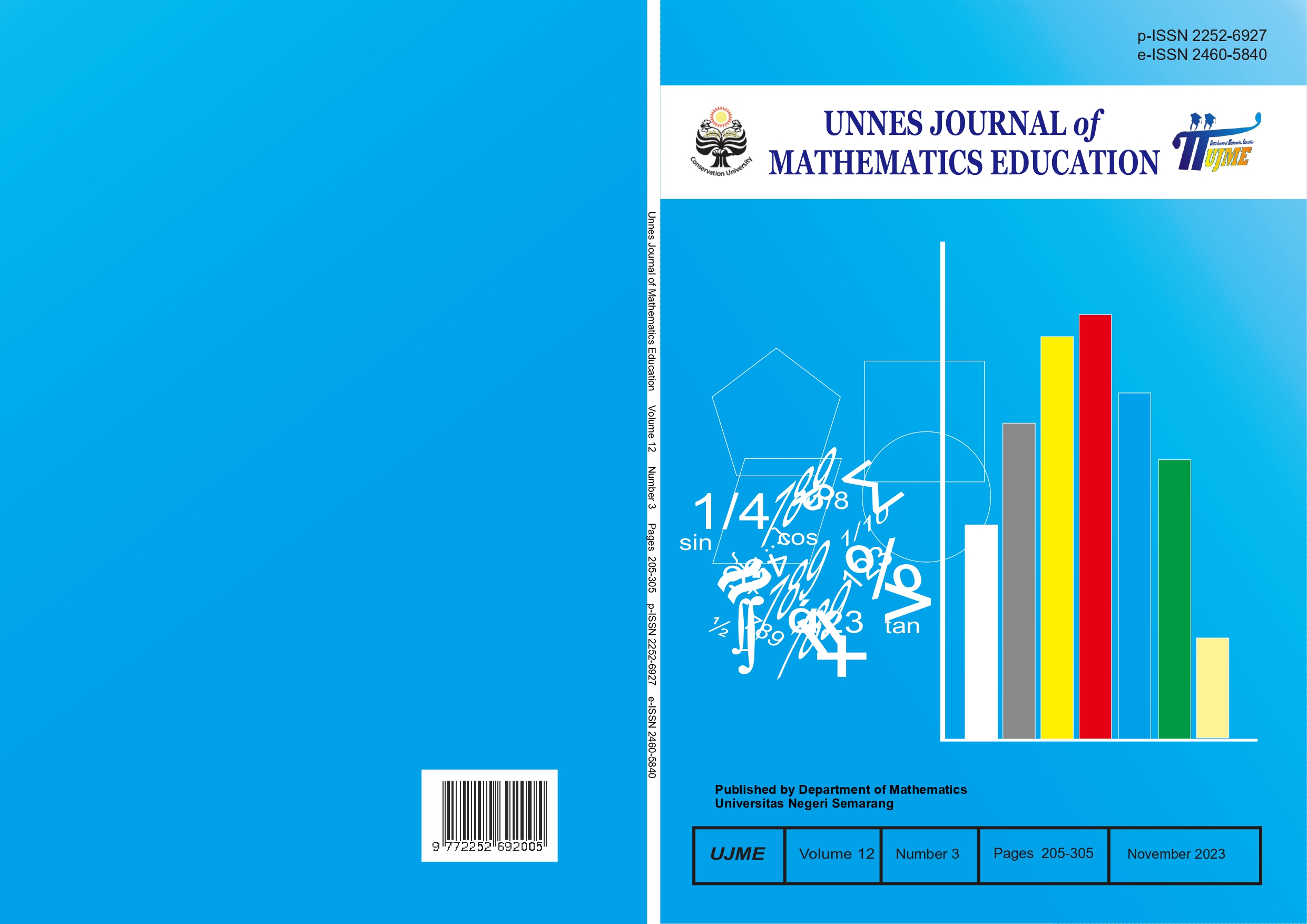Effectiveness of Jigsaw Type Cooperative Learning Model on Mathematical Problem Solving Ability Viewed from Student Learning Motivation
##plugins.themes.academic_pro.article.main##
Abstract
Mathematical problem-solving skills are one of the main things in learning mathematics and must be developed in students. One of the learning models that is effective and considered capable of improving and improving mathematical problem-solving skills is the jigsaw-type cooperative learning model. This study aims to determine the effectiveness of the jigsaw-type cooperative learning model on mathematical problem-solving ability, analyze the influence of learning motivation on students' mathematical problem-solving ability on the jigsaw-type cooperative learning model, and describe mathematical problem-solving ability in terms of learning motivation in the jigsaw-type cooperative learning model. This study used mixed methods with a sequential explanatory design. The population of this study was all grade VII students of SMP N 1 Tambakromo for the 2021/2022 School Year. This research sample was obtained using a class random technique, namely class VII C students as an experimental group and class VII A students as a control group. There were 6 qualitative subjects drawn from the experimental group, namely 2 students with high learning motivation, 2 students with moderate learning motivation, and 2 students with low learning motivation. The results showed that (1) The jigsaw-type cooperative learning model is effective on students' mathematical problem-solving abilities; (2) There was a positive influence of student learning motivation on mathematical problem-solving ability in the jigsaw-type cooperative learning model of 48.4%; and (3) students with high learning motivation have high problem-solving ability, students with moderate learning motivation have moderate problem-solving ability, while students with low learning motivation.
##plugins.themes.academic_pro.article.details##
References
Arifin, S., Kartono, K., & Hidayah, I. (2019). The Analysis of Problem-Solving Ability in Terms of Cognitive Style in Problem Based Learning Model with Diagnostic Assessment. Unnes Journal of Mathematics Education Research, 8(2), 147-156.
Asri, K. (2016). Pembelajaran Kooperatif Tipe Jigsaw Untuk Meningkatkan Kemampuan Pemecahan Masalah Matematis Siswa Sekolah Menengah Atas Kabupaten Aceh Tengah. Jurnal Serambi Akademica, 4(2).
Dahar. R.W. 2011. Teori-teori Belajar dan Pembelajaran. Jakarta: Erlangga.
Hudoyo, Herman. (1988). Mengajar Belajar Matematika. Jakarta: Departemen Pendidikan dan Kebudayaan.
Isjoni. (2009). Pembelajaran Kooperatif Meningkatkan Kecerdasan Komunikasi Antar Peserta Didik. Pustaka Pelajar : Jakarta.
Karim, A. (2011). Penerapan metode penemuan terbimbing dalam pembelajaran matematika untuk meningkatkan pemahaman konsep dan kemampuan berpikir kritis siswa sekolah dasar. In Seminar Nasional Matematika dan Terapan (Vol. 30).
Kristanto , Vigih Hery. 2016. Efektivitas Pembelajaran Berbasis Masalah terhadap Kejenuhan Siswa. Jurnal Ilmiah Widya Warta. No. 01, Tahun XL, Januari 2016. Halaman 26 – 38.
Lestari, K. E., & Yudhanegara, M. R. (2017). Penelitian Pendidikan Matematika. Bandung: PT Refika Aditama.4
Lubis, N. A., & Harahap, H. (2016). Pembelajaran kooperatif tipe jigsaw. Jurnal As-Salam, 1(1), 96-102. [Online] Tersedia: https://jurnal-assalam.org/index.php/JAS/article/view/48
NCTM. 2000. Principles and Standards for School Mathematics. United States of America: The National Council of Teachers of Mathematics, Inc.
Nurhasanah Sti & Sobandi A. (2016). Minat Belajar sebagai Determinan Hasil Belajar Siswa. Jurnal Pendidikan Manajemen Perkantoran. 1(1), 128-135.
Oktavien, Y., Kusumah, Y. S., & Dahlan, J. A. (2012). Meningkatkan Kemampuan Pemecahan Masalah Matematis Siswa Sekolah Menengah Atas Melalui Pembelajaran Kooperatif Tipe Jigsaw. Jurnal Pengajaran MIPA, 17(2), 157-163.
Pujiastuti, H. (2020). Analisis kemampuan pemecahan masalah matematik siswa Smp pada materi bilangan bulat. AKSIOMA: Jurnal Matematika Dan Pendidikan Matematika, 11(1), 70-81.
Siregar, A.F., dkk. 2020. Efektivitas Model Pembelajaran Kooperatif tipe jigsaw Terhadap Kemampuan Pemecahan Masalah Matematis Siswa di MTs. Al Mukhtariyah Sungai Duapotibi. Jurnal MathEdu (Mathematic Education Journal). Vol. 3. Nomor 1. Maret 2020. [Online] Tersedia: http://journal.ipts.ac.id/index.php/MathEdu/article/view/1232
Slavin, R.E. (2005). Cooperative learning “theori, research and practice. London: Allyn and Bacon.
Sugiyono. (2016). Metode Penelitian Pendidikan (Pendekatan Kuantitatif, Kualitatif, dan R&D). Bandung: Alfabeta.
Suherman, E. (2003). Strategi pembelajaran matematika kontemporer. Bandung: Jica.
Sumartini, T.S. Peningkatan Kemampuan Pemecahan Masalah Matematis Siswa melalui Pembelajaran Berbasis Masalah. 2016. Jurnal “Musharafa”. Volume 5. Nomor 2. Mei 2016. [Online] Tersedia: https://journal.institutpendidikan.ac.id/index.php/mosharafa/article/view/mv5n2_12
Syah, Muhibbin. 2003. Psikologi Pendidikan dengan Pendekatan Baru. Bandung: Rosdakarya.
Syahrir, S. P. (2012). Pengaruh Pembelajaran Kooperatif Tipe Jigsaw dan Teams Game Turnamen (TGT) terhadap Motivasi Belajar dan Keterampilan Matematika Siswa SMP (Studi eksperimen di SMP Darul Hikmah Mataram). Kontribusi Pendidikan Matematika dan Matematika dalam Membangun Karakter Guru dan Siswa. [Online] Tersedia: https://eprints.uny.ac.id/10101/1/P%20-%2089.pdf
Wu, S., Amin, H., Barth, M., Malcarne, V., & Menon, V. (2012). Math anxiety in second and third graders and its relation to mathematics achievement. Frontiers in psychology, 3(162), 1-11. Doi: https://doi.org/10.3389/fpsyg.2012.00162
